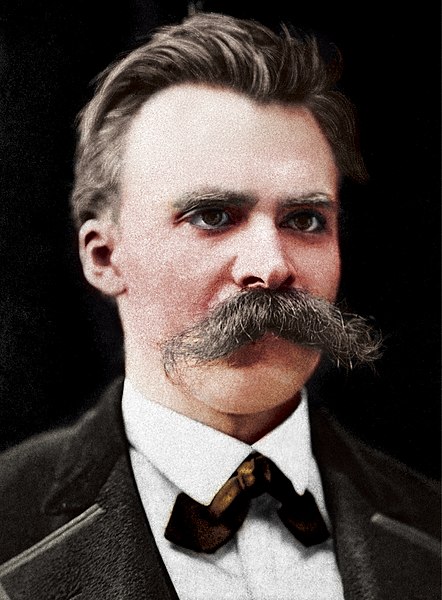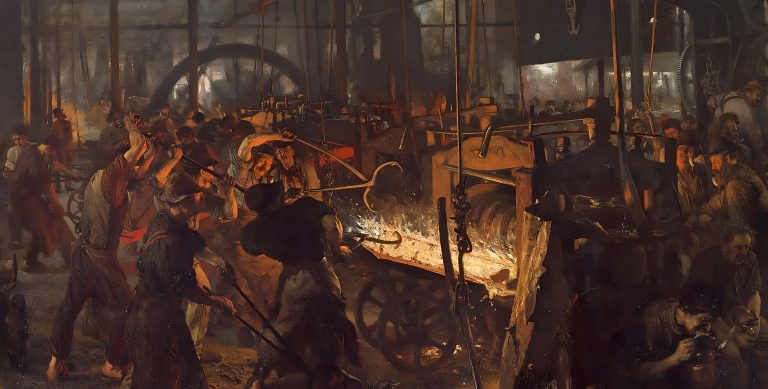
Not to be confused with the collection of notes arranged after Nietzsche’s death into a publication that is also called ‘The Will to Power,’ this video details the concept of the will to power as postulated by the 19th Century German philosopher Fredrich Nietzsche, who had a way of summing up complex ideas in mere sentences, with just one or two lines of thought he was able to cast light upon the murky and complex realm of human nature giving us an insight into the reasons behind the ever-present chaos lurking at the borders of reason and sanity that we see around ourselves in both the political and media spheres that make up the background hum of the world in which it’s become routine for politicians to destroy the careers of their rivals, for countries to wage war upon one another whilst celebrities demand the attention of the masses through beauty tips, surgery and movie appearances, all at the same time that trust in public institutions and governance is collapsing everywhere across the West.
“What is good? – All that heightens the feelings of power, the will to power, power itself in man. What is bad? – All that proceeds from weakness. What is happiness? – The feeling that power increases – that a resistance is overcome.”
― Friedrich Nietzsche – The Anti-Christ
The world is made up of competing wills to power expressing itself in myriad ways, earlier philosophers such as Arthur Schopenhauer saw the world as a product of Will and Representation, stating that all living things had a will to live, but Nietzsche saw clearly, that the will that animated all creatures was in fact a will to power. If living things only had a will to live, then they would preserve themselves at all costs taking no risks, but that’s not what we see in either the animal kingdom or the human realm. The examples are endless, females protect their young from predators risking their very lives in the process, whilst firefighters run into burning buildings to combat the blaze, rescuing people not related to them, risking life and limb in the process. Even the pub pisshead who outstretches his arms in a threating pose in preparation for a fight because another drunkard provoked him does so because he chooses to gain status through the will to power, rather than risk being called a coward by backing down. The will to power is everywhere and once seen cannot be unseen. The stuntman who risks all during a movie shoot is as much a manifestation of the will to power as a cheetah sprinting after an antelope. The will to power is alive and well on the internet where beauty bloggers compete with one another to be high status females and conspiracy theorists claim to be the only source of truth when it comes to the discovery of evil intent amongst our rulers. The will to power is the source of all human happiness, even the Buddhist monk meditating his way to Nirvana is manifesting his will to power in the pursuit of enlightenment as is the fervent Christian banging a tambourine in the street and proselytising for the lord.
“The will to power can manifest itself only against obstacles; it therefore goes in search of what resists it–this is the primitive tendency of the protoplasm when it extends its pseudopodia and feels about it. The act of appropriation and assimilation is, above all, the result of a desire to overpower, a process of forming, of additional building and rebuilding, until at last the subjected creature has become completely a part of the superior creature’s sphere of power, and has increased the latter.”
― Friedrich Nietzsche – The Will to Power
Here Nietzsche further elaborates the very simple premise that personal happiness, the result of discharging the Will to Power seeks its own opposition because it cannot be expressed otherwise. Indeed, once you get a firm understanding of Nietzsche’s concept of the Will to Power under your belt you start to see it everywhere, from the guy that steals your parking spot, or hops in front of you in the queue at the post office, to the bad supervisor who spends all day barking orders, overworking you and then berating you when it all goes wrong, to the blue haired social justice warrior screeching at the sky in response to the election of Donald Trump.
The will to power is everywhere you look and once revealed so blindingly obvious that you will wonder how you didn’t notice it before. Power needs opposition in order to make itself felt, rebellions must be quelled, dissenting opinions stifled, opponents defeated, enemies disarmed, and critics humiliated so that the good feelings that arise from the successful discharge of one’s strength can be felt. This is why explorers push on into the unknown, whacking back the undergrowth with a machete in search of a lost city and why people seek out mountains to climb desperate to be the first to the summit. It’s the reason why athletes choose to train and race, they want to be the best, the fastest, the strongest because the will to power is alive and well within them. A person who hits the gym and sticks to a diet plan is manifesting the will to power, subjugating their body to the demands of the will that they be healthier, fitter and more attractive, should they fail, give up or otherwise be unable to achieve their goals, depression, anger and a loss of self-esteem soon follows, mental illness is more often than not, the result of an unsatisfied will to power. If you feel depressed because you have a bad manager in the world of work who spends all of his day making your life a misery it’s because he’s created a successful avenue for his will to power at the expense of your own which is why it’s no accident that political activists are often the most saddest people on earth, they want to be the change the world needs and if unsuccessful turn to the antidepressants eagerly prescribed by doctors everywhere.
“To those human beings who are of any concern to me I wish suffering, desolation, sickness, ill-treatment, indignities—I wish that they should not remain unfamiliar with profound self-contempt, the torture of self-mistrust, the wretchedness of the vanquished: I have no pity for them, because I wish them the only thing that can prove today whether one is worth anything or not—that one endures.” ― Friedrich Nietzsche – The Will to Power
Nietzsche’s philosophy is complex, rich yet surprisingly simple, we should endure all that we can, even sickness and injury in order to overcome it, discharging our will to power in a way that we find to be good such as seeking out our own goals and challenges so that we might master them becoming a better person in the process, a superman able to make our own morality free to choose any goals after smashing apart all of our pre-existing beliefs and values, discarding all that does not serve us, keeping only the things that we deem to be a personal good.
Nietzsche suggested that we find high art and the practice of skill to be a good outlet for the will to power from which we can use it to create things of sublime beauty such as beautiful architecture, sculptures, paintings, wonderful music, fantastic cuisine whilst continually striving to be the best at whatever it is that we choose to do. The will to power isn’t always destructive it can be a creative force for tremendous good to the benefit of many if applied in the right way. In doing so we take part in an eternal process of ‘self-overcoming,’ always improving and refining our being, living authentically away from the common herd of mass ideologies such as Christianity, Islam, Communism, Buddhism, Environmentalism, Social Justice and so on making us all Nietzschean iconoclasts, always against the spirt of the age and any popularist movements that would tell us how to live.
The will to power is alive and well in any politician, bureaucrat, media, or economic influencer who wants to inflict their own vision of a good life upon you and whilst this outlet to the will to power is entirely normal being a consequence of the physical laws that govern the universe that doesn’t mean that we should all go along with it. Just because someone at the WEF thinks we should eat bugs to save the planet isn’t a good reason for us to begin doing so, not unless the desire to eat bugs is an authentic part of our own will, for most of us it isn’t, which is why we should reject it out of hand.
Likewise, should a young woman demand that we start calling her by her preferred pronouns of ‘they/them’ then we are blithely free to ignore this requirement and refer to her by any term we’d prefer regardless of her tendency to take offence. Their will to power is never greater than our own, let us remind ourselves that power seeks its own opposition often emboldening people who have had a taste of victory to become ever more tyrannical which is why revolutionaries often become a mirror image of the despots they once toppled and weak people discharge their strength by claiming special status and privileges amidst the protection of a group based identity that matches some characteristic that they’ve chosen to centre their entire persona around whether that be their genetic heritage, their sex or bedroom preferences. As Nietzschean Iconoclast’s we take no lessons from the victim Olympics, we distain those that are only strong when in the midst of a crowd.
The Nietzschean concept of the Will to Power is, when it’s all said and done, the only game in town, because we’re all compelled to play it, so let us discharge our power and live well, authentically, in accordance with our own highest or most noble values. We must view this task as a grand adventure or a game that we play relentlessly, because it’s where all sensations of meaning in life must come from.
Friedrich Nietzsche’s conception of the “Will to Power” is a central concept in his philosophy, though it’s worth noting that it’s subject to various interpretations. Nietzsche himself did not systematically develop this concept in any single work, but rather explored it across many of his writings. The “Will to Power” can be understood as a fundamental drive inherent in all individuals, influencing their actions, thoughts, and interpretations of the world.
Here are key aspects of Nietzsche’s conception of the Will to Power.
A Driving Force of Life: Nietzsche saw the Will to Power not just as a psychological drive, but as a fundamental force that permeates all life. It’s not merely a will to survive or to procreate, but a will to assert and expand one’s power and influence.
Beyond Good and Evil: Nietzsche’s idea of the Will to Power is deeply connected with his critique of traditional moral values. He challenges the conventional dichotomies of good and evil, suggesting that these are constructs that stem from weaker wills asserting their power through moral frameworks.
Creative Force: The Will to Power is also a creative force. It’s not just about domination or control but about overcoming oneself and creating new values and interpretations of the world.
Overcoming and Self-Overcoming: The Will to Power is crucial in the process of self-overcoming, where an individual transcends their current limitations and re-evaluates their values.
“What is great in man is that he is a bridge and not a goal: what can be loved in man is that he is an overture and a going under.” (From “Thus Spoke Zarathustra”).

